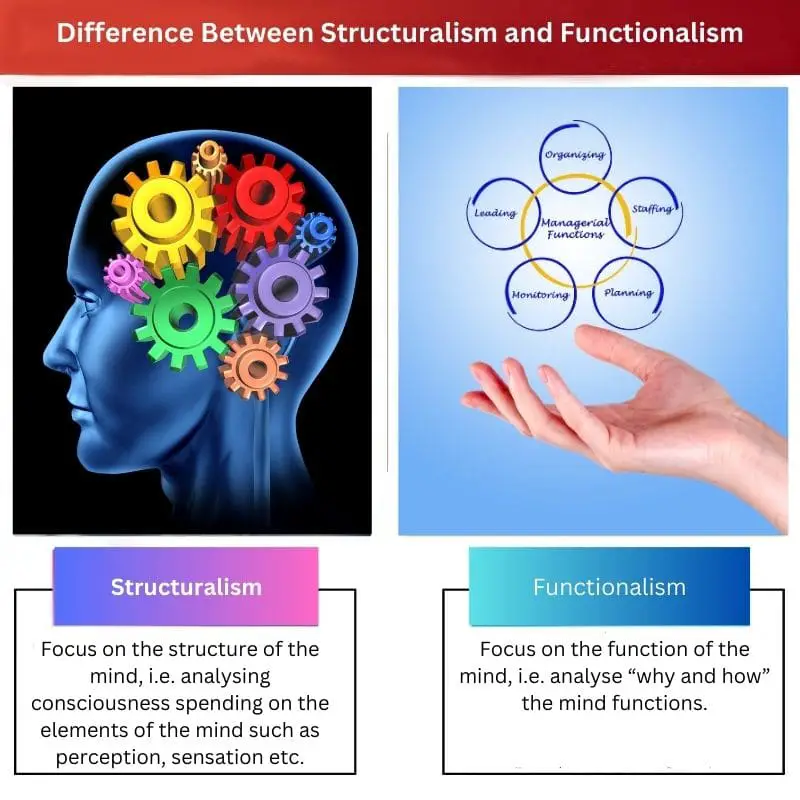Historically when psychology was first established, the main focus was how to describe human behaviour and examine the mind. This led to the development of the first two schools of thought, i.e. structuralism and functionalism.
Key Takeaways
- Structuralism is a psychological approach that seeks to understand the mind by analyzing its basic components and relationships, focusing on the structure of mental processes.
- Functionalism is a psychological approach that examines how mental processes adapt and contribute to an individual’s ability to survive and thrive in their environment.
- These early psychological theories provided a foundation for modern approaches to understanding the human mind and behavior, with structuralism emphasizing analysis and functionalism focusing on adaptation.
Structuralism vs Functionalism
Structuralism is a psychological idea that looks at the importance of the individual elements of consciousness and their organization into a coherent system. Functionalism, is a psychological idea that focuses on the adaptive functions of behavior and their contribution to an organism’s well-being.

Structuralism was introduced by William Wundt and focused on the structure of the mind, i.e. understanding consciousness through introspection.
On the other hand, functionalism was introduced by William James, focusing on why and how the mind functions, i.e. what is the purpose behind a specific behaviour.
Comparison Table
| Parameter of Comparison | Structuralism | Functionalism |
|---|---|---|
| Lead by | William Wundt | William James |
| Main theme/ focus | Focus on the structure of the mind, i.e. analysing consciousness spending on the elements of the mind such as perception, sensation etc. | Focus on the function of the mind, i.e. analyse “why and how” the mind functions. |
| Primary method | Introspection, i.e. examining and becoming aware of one’s own conscious, feelings and emotions | Focuses on applications with the help of cognitive testing and behavioural methods. |
| Criticism | It is too subjective. As a result, it lacks reliability. Also, it focuses on internal behaviour, which cannot be observable and measured. | It puts a lot of focus on objective matters and ignores the subjectivity of individual thought processes. |
What is Structuralism?
During the nineteenth century, chemistry and physics advanced greatly by analyzing complex compounds (molecules) into their elements (atoms).
These accomplishments led psychologists to look for the intellectual elements in the brain that together create more complex life experiences.
Like chemists who find and analyze various molecules in water, psychologists experiment and analyze to find the taste of orange juice(perception) into components such as sweet, bitter, and cold (sensations).
Under the training of Wundet, the first prime advocate of this theory in the US was E. B. Titchener, a Cornell University psychologist. He introduced structuralism – “the analysis of mental structures” – to explain the branch of psychology.
Wilhelm Wundt (1832–1920) was the first person to be called a psychologist. He was a German scientist. He established the psychology laboratory at Leipzig, Germany, in 1879.
In his famous book named Principles of Physiological Psychology in 1873, he described “psychology as a scientific study of conscious experience,
and he believed that the goal of psychology was to identify components of consciousness and how those components combined to result in our conscious experience.”
As psychology is a science, structuralism uses introspection as an experimental method to study the mind. This led to a lack of reliability due to data being subjective.
Also, structuralism focuses on internal behaviour, which cannot be observable and measured.
But structuralism is still significant as it is the first school of thought in psychology and part of experimental psychology.

What is Functionalism?
Though structuralism came as the first school of thought, many psychologists opposed its analytic nature. One of them was William James.
He was a well-known psychologist at Harvard University. According to him, analyzing and knowing the components of consciousness was less critical and insufficient.
Importance should be given to why and how consciousness occurs.
Hence, he came up with his approach, i.e. functionalism. It focuses on studying how the mind works in the environment to adapt and function healthily.
Functionalism developed as a reaction/counterargument to structuralism. The theory of Charles Darwin highly influenced it.
Functionalism focuses on why and how the mind functions, i.e. what is the purpose behind certain behaviour.
It also puts greater importance on individual differences, which has resulted in a more significant impact on education.
Functionalism has influenced the school of behaviourism and applied psychology. It has also influenced the education and academic system as well. It puts a lot of focus on objective matters and ignores the subjectivity of individual thought processes.

Main Differences Between Structuralism and Functionalism
- Structuralism was founded by William Wundt, whereas William James founded functionalism.
- Structuralism Focus on the structure of the mind, i.e. analysing consciousness spending on the elements of the mind such as perception, sensation etc., whereas functionalism focuses on the function of the mind, i.e. analysing “why and how” the mind functions.
- Structuralism uses introspection, i.e. examining and becoming aware of one’s consciousness, feeling and emotions, whereas functionalism Focuses on applications with the help of cognitive testing and behavioural methods.
- Structuralism is criticised as it is too subjective. As a result, it lacks reliability. Also, it focuses on internal behaviour, which cannot be observable and measured. Functionalism lacks objectivity and reliability as the data collected cannot be measured and analysed.
- Structuralism became a part of experimental psychology, whereas Functionalism formed as a reaction or counterargument to structuralism with a heavy influence from Charles Darwin’s theory.

This article comprehensively illustrates the contrasting principles of structuralism and functionalism, offering a well-structured analysis of their origins and methodologies. It is a commendable resource for understanding the historical foundations of psychology.
The meticulous comparison between structuralism and functionalism enhances the scholarly value of the article, offering a rich source of knowledge for psychology aficionados.
Absolutely, the article provides a thorough examination of the key concepts, making it a compelling read for both scholars and enthusiasts.
This article lucidly renders the fundamental disparities between structuralism and functionalism, encapsulating their theoretical essence and historical underpinnings. A commendable exposition of early psychological paradigms.
The scholarly rigour in delineating the nuances between structuralism and functionalism is praiseworthy, fostering an erudite understanding of their formative principles.
Indeed, the article offers a comprehensive portrayal of the pivotal concepts, serving as a scholarly repository of knowledge for psychology enthusiasts.
While the detailed analysis of structuralism and functionalism is valuable, it would be beneficial to include real-world examples to elucidate their theoretical frameworks and practical implications.
I agree with your point. Real-world applications would enhance the article’s relevance and engage readers effectively.
Your suggestion for incorporating practical examples is well-founded. It would bridge the gap between theoretical concepts and real-life scenarios.
The historical exposition of structuralism and functionalism within this article is illuminating, providing invaluable insights into the origins of psychological inquiry. It offers a compelling narrative of the evolution of psychological thought.
I concur with your assessment. The historical narrative captures the essence of psychological development, engrossing readers in the evolutionary trajectory of academic inquiry.
Your articulation of the article’s historical narrative resonates with its profound impact, fortifying its role in elucidating the historical continuum of psychological inquiry.
The juxtaposition of structuralism and functionalism in this article is a thought-provoking exploration of early psychological paradigms. It serves as an erudite disquisition on the foundational principles of psychological inquiry.
I share your appreciation for the intellectual discourse articulated in the article. It astutely illuminates the historical origins of psychology, fostering a profound understanding of the subject matter.
The comparison between structuralism and functionalism offers a valuable insight into the contrasting approaches to understanding the human mind. However, it would be intriguing to explore the intersection of these theoretical frameworks and their potential synergy in contemporary psychology.
I echo your sentiment. Investigating how these early theories intersect and inform modern psychology would elevate the article’s intellectual discourse.
Your point about exploring the convergence of structuralism and functionalism is intriguing. It would add depth to the article by examining their complementary aspects.
The comparison between structuralism and functionalism is an essential aspect of the article, shedding light on their distinct approaches to psychology. However, it would be valuable to explore how these theories have influenced contemporary psychology.
This article presents a compelling overview of structuralism and functionalism, elucidating their foundational significance in the evolution of psychology. The authoritative historical context establishes the groundwork for understanding their contributions to contemporary psychological perspectives.
I share your perspective. The historical backdrop provides a robust foundation for comprehending the enduring impact of these early psychological paradigms.
While this article is informative, it lacks a critical perspective on the limitations and criticisms of structuralism and functionalism. A more balanced analysis would provide a deeper understanding of the subject matter.
I see your point. It would be beneficial to address the drawbacks of these early psychological theories as well.
I agree with your assessment. A more critical examination would enhance the article’s credibility.
This article is an enlightening exploration of the roots of psychology and how it has evolved over time. It provides a comprehensive overview of the key differences between structuralism and functionalism, helping to understand the foundation of modern psychology.
I couldn’t agree more! The in-depth analysis and historical context are truly fascinating.
I appreciate the clarity and detail in this article. It’s valuable information for anyone interested in psychology.